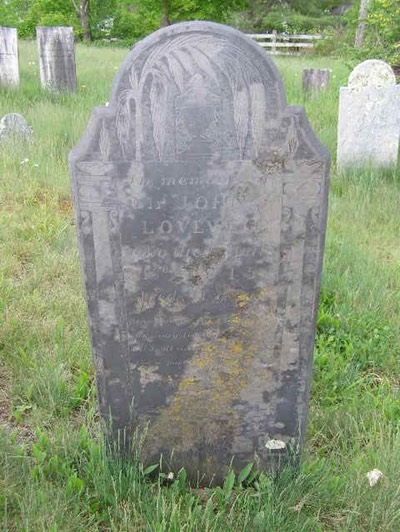
Headstone of Prof. Lovewell’s grandfather, John Lovewell (photo by Carol Ramsey from Findagrave.com)
We’re familiar with the census forms which tell us where our ancestors lived and when, who bedded down under their roofs, and how much livestock and personal wealth they owned. Our searches sometimes turn up marriage records to inform us where, when and whom they wed. If they purchased land from Uncle Sam there’s often a file about the sale awaiting an online search. Did an ancestor serve in the U. S. Military? The enlistment form probably contains a personal description. If someone filed for a pension, the weighty case file can reveal some truly eye-opening stuff. However, it still seems remarkable to me that, not only do we have so many different sources of information about our forebears, but in some cases, a number of documents in which they shared their thoughts.
For Thomas Lovewell, there’s a single handwritten letter, one containing his plan for combating Indian attacks along White Rock Creek, addressed to Kansas Governor Samuel Crawford. Transcripts of Thomas's testimony in Indian depredation cases offer candid opinions about a few of his neighbors at White Rock, while occasionally providing a sense of his conversational style, which seems surprisingly literate for an uneducated farmer on the Kansas frontier.
Thomas’s cousin, Prof. Joseph Taplin Lovewell, left behind dozens of published articles on scientific matters, as well as one melancholy letter touching on the death of his first wife and his struggle to put his life back together by joining the faculty of Washburn College in Kansas. Of especial interest for Lovewell historians there’s also his 1896 application for membership in Sons of the American Revolution.
My grandfather John Lovewell served in the War of the Revolution from its opening in 1775. He served in various regiments and was at last captured by the British and taken to Quebec. He was exchanged and returned home and I am not certain that he was afterward in the service.
He was at the Battle of Bunker Hill, though not in the fight, probably, but he was near enough so that he could afterward describe the sound of the musketry in that eventful day. After the close of the war he emigrated from Dunstable N. H. (now Nashua) to Orange Co., Vt. That whole region including much of Vt. and northern N. H. was then and for a long time afterward called Coos County.
My grandfather’s cousin Nehemiah Lovewell had previously settled in a place in Orange Co., Vt., now called Corinth. Here my grandfather found his cousin Nehemiah with his large family of thirteen children.
Five of the seven sons with their father had been John’s companions in arms during the war. Nehemiah was the posthumous son of the celebrated Indian fighter, Capt. John Lovewell, who was killed in a battle with the Peqauket Indians at Lovewell’s Pond near Fryeburg, Me. One of the younger of Nehemiah’s children was Vodica, born Apr. 18, 1764, and though he was twenty years her senior, she married her 2nd cousin John and became my grandmother. She was my only grandparent living after I was born. I well remember her and much that fell from her lips of the old days. My grandfather John died in 1815 when my father was only twelve years old.
The farm he left was encumbered with debt, and an older brother dying soon after, the care of the family was left to my father. He led an active useful life, but did not keep the records of the family with much care. My grandfather had many papers including old commissions of Colonial days. Such of these as are preserved are now deposited in the Historical Library, Montpelior, Vt.
If Joseph Taplin Lovewell remembered Grandma Vodica “and much that fell from her lips of the old days,” he must have been a quick study (he did grow up to be a scientist, after all) because Vodica died when Joseph was only six years old. Still, it’s fascinating to think that the man who placed the first phone call across the Mississippi, a man whose scientific tinkering and writing continued well into the 20th century, had that direct contact with a talkative representative of pre-Revolutionary America.
Incidentally, in Joseph’s application he calls himself the grandson of John Lovewell, but the great-grandson of a man named Zaccheus Lovewell, and the great-great-grandson of John Lovewell, who was the son of Robert and Elizabeth Lovewell. He also refers to his grandparents John and Vodica Lovewell as 2nd cousins, which would be true if, as he thought, his great-grandfather was only a cousin of Grandma Vodica’s father, Nehemiah, and not his brother, which he actually seems to have been. Yes, this is all terribly complicated, and I can hardly keep it straight while trying to explain it.
Sixteen years later, when Joseph’s daughter Bertha Lovewell Dickinson submitted her own application to the Daughters of the American Revolution, she amended her father’s genealogy to omit Zaccheus, giving the names of his successive ancestors as John, John, John and Robert. I very much doubt whether either of these genealogies is quite correct - but more on that later.